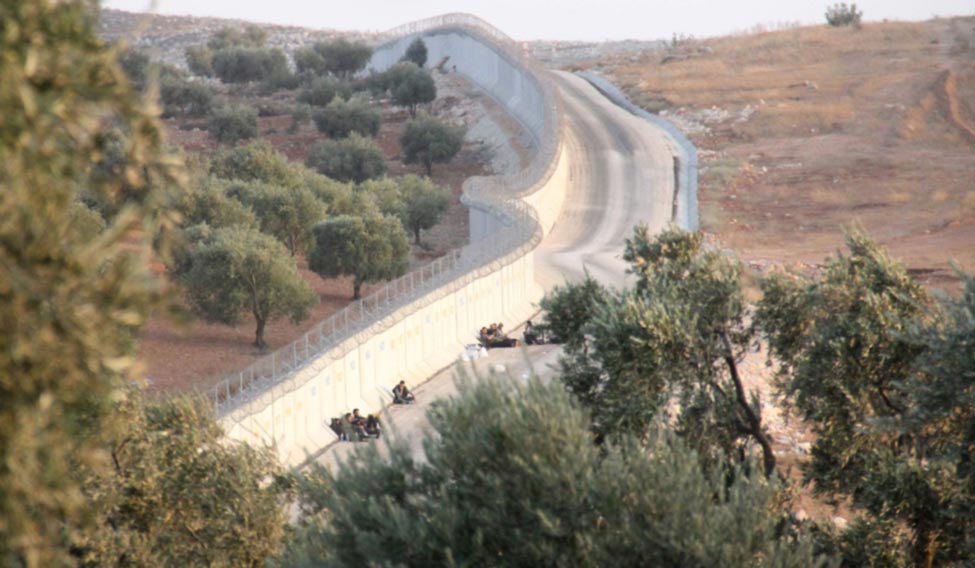Turkish troops today exchanged fire with Syria-based jihadists as Ankara massed military vehicles on the frontier ahead of an expected operation to oust Al-Qaeda's former Syrian affiliate from Idlib province.
President Recep Tayyip Erdogan yesterday announced the launch of an operation by pro-Ankara Syrian rebel forces, backed by the Turkish army, to reimpose security in Idlib.
Most of the northwestern region is controlled by Hayat Tahrir al-Sham (HTS), a group led by Al-Qaeda's former Syria affiliate, which ousted more moderate rebels in recent months.
Turkey has massed special forces and military hardware including tanks on the border but the operation has yet to begin in earnest, monitors and sources on the ground said.
But Turkish forces fired seven mortars over the border with the aim of easing the passage of the pro-Ankara Syrian forces, the Dogan news agency reported.
Turkish forces have also been seen removing parts of the security wall Ankara has built on the border so that military vehicles can pass through into Syria.
Pro-government media said that the operation was now into its "second day" and it was not immediately clear what the Turkish military's next move would be.
HTS jihadists this morning opened fire on Turkish forces removing part of a wall along the border between Turkey and Idlib, witnesses and the Syrian Observatory for Human Rights monitor said.
The Observatory reported "heavy exchanges of fire", but said the incident did not appear to mark the start of the operation Erdogan described yesterday.
Turkish armoured vehicles and troops were waiting on the border, from where smoke could be seen from the mortar fire, an AFP photographer said.
Television images showed locals in the Turkish border town of Reyhanli in Hatay province cheering as more armoured vehicles were driven through the town overnight.
Ankara appears keen to oust the HTS from Idlib in order to create a de-escalation zone into which it can send military monitors to implement a ceasefire.
Turkey, along with Syrian regime allies Russia and Iran, earlier this year agreed a deal to implement four such ceasefire zones in Syria as a prelude to talks on a peace deal.
The zone encompassing Idlib is the last one to go into effect, and its implementation has been held up by fierce opposition from HTS.
The group yesterday warned "treacherous factions that stand by the side of the Russian occupier" should only enter the area if they want "their mothers to be bereaved, their children to be orphaned, their wives to be widowed".
Turkey earlier this year wrapped up its half year Euphrates Shield operation against jihadists and Kurdish militia in Aleppo province that involved both the Turkish army and Syrian rebels.
The Hurriyet daily said the pro-Ankara forces involved in this operation, which Turkey calls the Free Syrian Army (FSA), would be the same as in Euphrates Shield.
"Since summer, Turkey has been reorganising those rebels and pulling them into a new politico-military structure that is supposed to be more cohesive," said Aron Lund, fellow with The Century Foundation think tank.
Turkey is working in cooperation with Russia, even though they have been at loggerheads throughout the over six-year Syrian civil war, with Moscow backing the regime and Ankara the rebels seeking to oust President Bashar al-Assad.
After meeting Erdogan in Ankara on September 28, Russian President Vladimir Putin declared the right conditions now existed to end the war that has killed an estimated 330,000 people since 2011.
Turkey has also long warned it could also move against the People's Protection Units (YPG) Kurdish militia who control Afrin to the east and which Ankara considers a terror group.
Erdogan yesterday warned that "new initiatives" would follow after the Idlib operation.
"Today Idlib, tomorrow Afrin," said the headline in the Yeni Safak daily, describing the deployment as a "peace operation".






